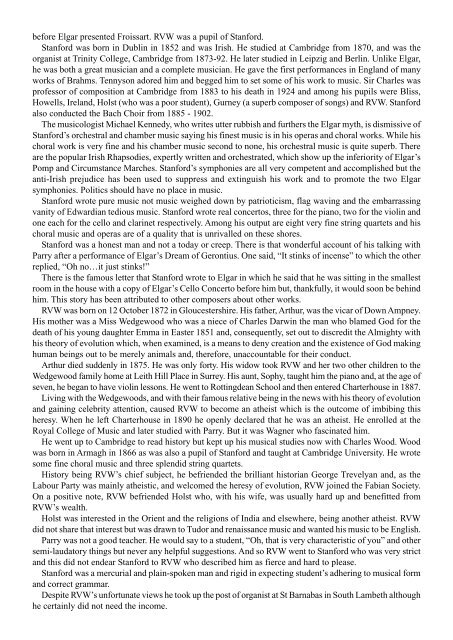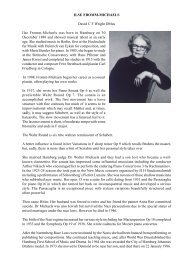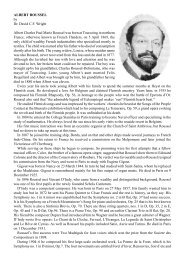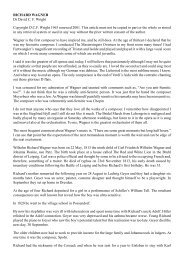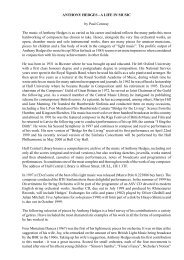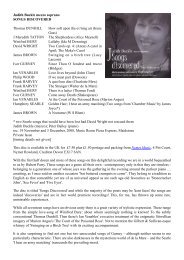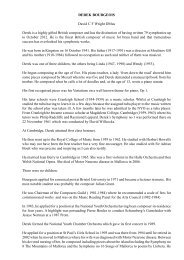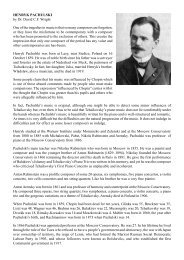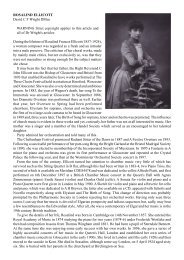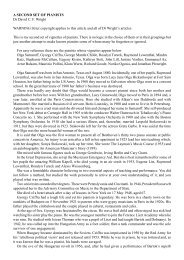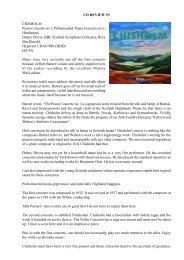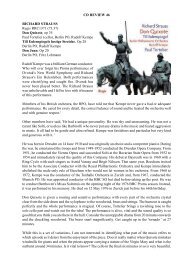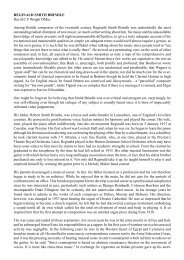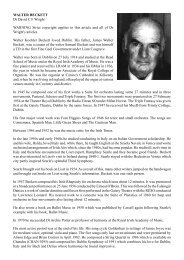Ralph Vaughan Williams - Dr David Wright
Ralph Vaughan Williams - Dr David Wright
Ralph Vaughan Williams - Dr David Wright
Create successful ePaper yourself
Turn your PDF publications into a flip-book with our unique Google optimized e-Paper software.
efore Elgar presented Froissart. RVW was a pupil of Stanford.Stanford was born in Dublin in 1852 and was Irish. He studied at Cambridge from 1870, and was theorganist at Trinity College, Cambridge from 1873-92. He later studied in Leipzig and Berlin. Unlike Elgar,he was both a great musician and a complete musician. He gave the first performances in England of manyworks of Brahms. Tennyson adored him and begged him to set some of his work to music. Sir Charles wasprofessor of composition at Cambridge from 1883 to his death in 1924 and among his pupils were Bliss,Howells, Ireland, Holst (who was a poor student), Gurney (a superb composer of songs) and RVW. Stanfordalso conducted the Bach Choir from 1885 - 1902.The musicologist Michael Kennedy, who writes utter rubbish and furthers the Elgar myth, is dismissive ofStanford’s orchestral and chamber music saying his finest music is in his operas and choral works. While hischoral work is very fine and his chamber music second to none, his orchestral music is quite superb. Thereare the popular Irish Rhapsodies, expertly written and orchestrated, which show up the inferiority of Elgar’sPomp and Circumstance Marches. Stanford’s symphonies are all very competent and accomplished but theanti-Irish prejudice has been used to suppress and extinguish his work and to promote the two Elgarsymphonies. Politics should have no place in music.Stanford wrote pure music not music weighed down by patrioticism, flag waving and the embarrassingvanity of Edwardian tedious music. Stanford wrote real concertos, three for the piano, two for the violin andone each for the cello and clarinet respectively. Among his output are eight very fine string quartets and hischoral music and operas are of a quality that is unrivalled on these shores.Stanford was a honest man and not a today or creep. There is that wonderful account of his talking withParry after a performance of Elgar’s <strong>Dr</strong>eam of Gerontius. One said, “It stinks of incense” to which the otherreplied, “Oh no…it just stinks!”There is the famous letter that Stanford wrote to Elgar in which he said that he was sitting in the smallestroom in the house with a copy of Elgar’s Cello Concerto before him but, thankfully, it would soon be behindhim. This story has been attributed to other composers about other works.RVW was born on 12 October 1872 in Gloucestershire. His father, Arthur, was the vicar of Down Ampney.His mother was a Miss Wedgewood who was a niece of Charles Darwin the man who blamed God for thedeath of his young daughter Emma in Easter 1851 and, consequently, set out to discredit the Almighty withhis theory of evolution which, when examined, is a means to deny creation and the existence of God makinghuman beings out to be merely animals and, therefore, unaccountable for their conduct.Arthur died suddenly in 1875. He was only forty. His widow took RVW and her two other children to theWedgewood family home at Leith Hill Place in Surrey. His aunt, Sophy, taught him the piano and, at the age ofseven, he began to have violin lessons. He went to Rottingdean School and then entered Charterhouse in 1887.Living with the Wedgewoods, and with their famous relative being in the news with his theory of evolutionand gaining celebrity attention, caused RVW to become an atheist which is the outcome of imbibing thisheresy. When he left Charterhouse in 1890 he openly declared that he was an atheist. He enrolled at theRoyal College of Music and later studied with Parry. But it was Wagner who fascinated him.He went up to Cambridge to read history but kept up his musical studies now with Charles Wood. Woodwas born in Armagh in 1866 as was also a pupil of Stanford and taught at Cambridge University. He wrotesome fine choral music and three splendid string quartets.History being RVW’s chief subject, he befriended the brilliant historian George Trevelyan and, as theLabour Party was mainly atheistic, and welcomed the heresy of evolution, RVW joined the Fabian Society.On a positive note, RVW befriended Holst who, with his wife, was usually hard up and benefitted fromRVW’s wealth.Holst was interested in the Orient and the religions of India and elsewhere, being another atheist. RVWdid not share that interest but was drawn to Tudor and renaissance music and wanted his music to be English.Parry was not a good teacher. He would say to a student, “Oh, that is very characteristic of you” and othersemi-laudatory things but never any helpful suggestions. And so RVW went to Stanford who was very strictand this did not endear Stanford to RVW who described him as fierce and hard to please.Stanford was a mercurial and plain-spoken man and rigid in expecting student’s adhering to musical formand correct grammar.Despite RVW’s unfortunate views he took up the post of organist at St Barnabas in South Lambeth althoughhe certainly did not need the income.


